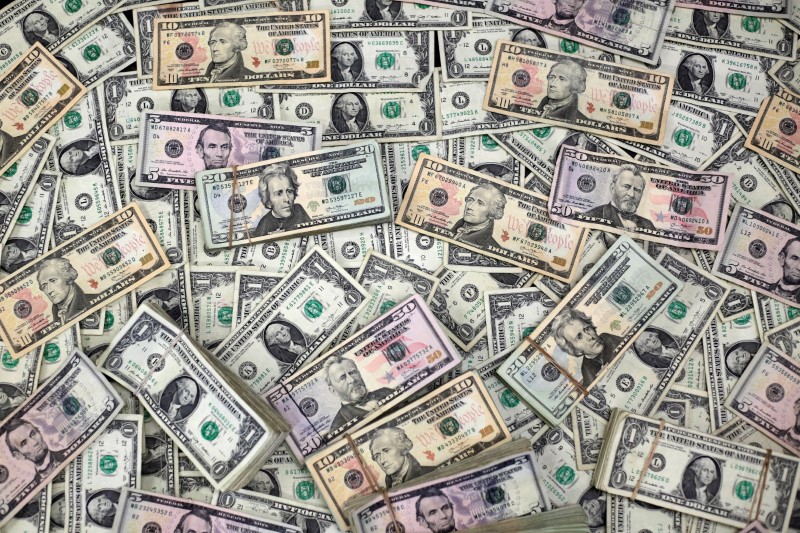
U.S. Dollar banknotes are seen in this photo illustration taken February 12, 2018. REUTERS/Jose Luis Gonzalez/Illustration
April 10, 2018
By Tommy Wilkes and Tom Finn
LONDON (Reuters) – The dollar dipped to a two-week low against a basket of currencies on Tuesday after Chinese President Xi Jinping’s promise to cut import tariffs eased concerns about a trade conflict.
Relatively high yielding currencies such as the Australian dollar <AUD=D3> and the Canadian dollar <CAD=D3> were the chief beneficiaries in London trading of a revival in risk appetite against the dollar while the yen and the Swiss franc weakened.
“President Xi’s comments and seasonality effects with April being traditionally a strong month for risk appetite is helping currency markets recover some ground,” said Simon Derrick, chief currency strategist at BNY Mellon in London.
Xi pledged to open the economy further and lower import tariffs on products including cars.
In his first public reaction to the tariff stand-off, Xi refrained from increasing tension with Washington and appeared to give clear backing for open economies rather than isolationism.
The dollar-yen rate rose 0.2 percent at 107.01 yen <JPY=> after going as high as 107.245.
Against a broader basket of currencies, the greenback was trading at a two-week low <.DXY> at 89.63. It has fallen nearly 1 percent in the last three trading sessions.
“Xi explicitly did not continue the trade war rhetoric so this is going to be risk-friendly and the market will be relieved,” said Kit Juckes, a macro strategist at Societe Generale.
Juckes said he expected high-yielding currencies including the Australian dollar and the New Zealand dollar to perform well as risk appetite returned.
ROUBLE WOES
But in a sign that market risks lurk on the sidelines, the Russian rouble <RUB=> tanked by 4 percent on Tuesday after a similar drop on Monday, raising some concerns that more weakness in the Russian currency could trigger a wider shakeout in broader positions in emerging markets.
Russian assets have been pounded following Washington’s move to impose major sanctions against Russian businessmen and their companies to punish Moscow for its alleged meddling in the 2016 U.S. election and other “malign activity”.
If the sell-off continues to accelerate and the rouble significantly decouples from economic fundamentals and oil prices, the central bank may consider selling hard currencies to slow down the pace of depreciation, Rabo Bank strategists wrote in a daily note.
Elsewhere, the euro <EUR=EBS> briefly jumped after a European Central Bank policymaker said the bank could raise its sub-zero deposit rate before normalizing monetary policy.
The single currency was trading 0.4 percent up on the day at at $1.2362 after rising to a high of $1.2378.
(Additional reporting by Saikat Chatterjee; Editing by Robin Pomeroy)
